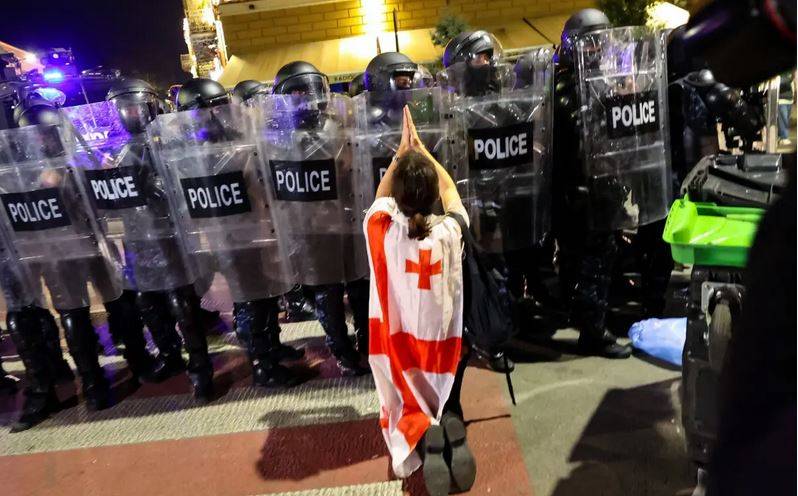922 Views
Tbilisi's Choice: Europe or Moscow? Protests and Tear Gas Reveal a Nation's Deep Political Split
Recently, on October 4th, coinciding with the holding of local elections in Georgia, countless protesters gathered in Tbilisi, the capital, and attempted to enter the presidential palace, known as Orbeliani. The recent events are somewhat symbolic of a public anger against the ruling party, "Georgian Dream." A widespread anger across Georgia that has not only led to a crisis of political and electoral legitimacy but has also caused a massive wave of widespread public protests in Tbilisi concurrent with the local elections, which is itself a clear sign of the declining legitimacy of the ruling "Georgian Dream" party.
Previously, many opposition parties had boycotted these elections, deeming them lacking in transparency and fairness, as they believe widespread fraud and illegal interference by the powerful are involved. Subsequently, some international institutions have also expressed concern in this regard, considering these elections a spectacle rather than a display of real competition. In this context, the protesters' attempt to enter the presidential palace is seen not only as a symbol of confronting force and power but also as a clear protest against the absence of legitimacy-granting mechanisms in the country's electoral system. According to some news agencies and independent sources, the clashes between protesters and government forces escalated to the point where police used water cannons, tear gas, and pepper spray to disperse the crowd and for security suppression. Physical clashes between government forces and protesters have been reported in parts of the capital, particularly around the presidential palace and Tbilisi's Freedom Square. Government officials have described these protests as an organized action aimed at destabilization and even an "attempted coup." Meanwhile, opponents believe these protests formed in response to public suppression and illegitimate elections. According to international observers, the recent events are a sign of escalating government violence and the collapse of public trust in state institutions in Georgia. It is worth noting that a significant portion of the protesters in these demonstrations, holding European Union flags and placards with slogans like "Europe is our home" and "No to Russia, Yes to Europe," demanded the Georgian government's return to the path of political and economic integration with the European Union.
Now, under these conditions, the continuation of street violence and the denial of election result legitimacy could push Georgia towards greater political instability and social division; unless the government and the opposition reach a dialogue-based and legal solution. While the "Georgian Dream" party insists on power, security, and controlling the political space, the opposition and a large segment of the general public accuse the government of "deviating from the pro-European path." Analysts believe that only through comprehensive national dialogue, reforming the electoral process, and adherence to the Georgian constitution can the emerging political tensions be prevented. Otherwise, Georgia risks becoming a country with a severely polarized society, similar to Ukraine before 2014.
On the other hand, it can be acknowledged that the stalling of Georgia's accession talks with the European Union in recent months is one of the main reasons for the protests. Some opponents accuse the ruling party of endangering the country's future with its Moscow-leaning policies, while ruling party officials claim they are continuing the European integration path. Conversely, artists and cultural figures have supported the protesters, calling for a peaceful transition of power. In this regard, the famous opera singer Paata Burchuladze went on a hunger strike in protest against the restricted cultural space and the establishment of a security atmosphere in Tbilisi. In another move, over 450 academics and students signed a statement condemning the interference of security and military forces in dispersing public gatherings and demanding freedom of expression and independence of action.
The widespread presence of cultural and academic figures has ensured that this movement is not limited to political protests alone but has turned into a deep social trend with broad participation from artists, social and cultural activists. Internationally, pressure on the Georgian government has also increased. International organizations, including Amnesty International and Western media, have accused the Georgian government of suppression similar to that in Russia. Some regional leaders, including Moldovan President Maia Sandu, have also declared their support for the people of Georgia and their right to peaceful protest, urging Tbilisi to adhere to the European integration path.
In conclusion, the recent events in Georgia can be seen as a sign of a deep crisis of trust between the people and the government. Events rooted in public dissatisfaction with an undemocratic path, stagnation in the European integration process, and increasing political pressures. The continuation of street violence and the security atmosphere not only increases the risk of political instability but could also crystallize a deep social divide and the danger of societal polarization. While European integration is at an impasse, Georgia's political future depends on the ability of the government and the opposition to accept national dialogue, reform electoral laws, and return to legal principles. As international pressure on Tbilisi increases, only through constructive engagement and respect for the law can the path to real growth and development be paved for this country.
Translated by Ashraf Hemmati from the original Persian article written by Navid Daneshvar
https://www.reuters.com/world/georgian-police-use-water-cannon-repel-protesters-presidential-palace-2025-10-04
https://en.m.wikipedia.org/wiki/2024–2025_Georgian_protests
https://www.amnesty.org/en/latest/news/2025/10/georgia-elections-marred-by-severe-reprisals-and-risk-of-further-violence
https://apnews.com/article/georgia-tbilisi-election-vote-crackdown-rally-protest-99857159a19c077edaf9d800207c1215
https://tass.com/world/2025253
https://www.aljazeera.com/news/2025/10/4/police-fire-water-cannon-at-georgia-protesters-near-presidential-palace
https://georgiatoday.ge/protests-continue-at-tsu-against-election-results-and-universitys-controversial-actions

Comment
Post a comment for this article